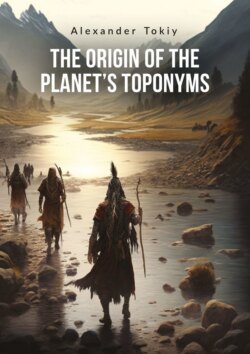Читать книгу The Origin of the Planet’s Toponyms - Alexander Tokiy - Страница 14
Ancient protoroots that formed modern languages
11. The most popular ancient protoroot: “kale”, “gale” and “liga”
ОглавлениеWith the development of language, people have learned to supplement the meanings of individual sounds with other sounds that complement, explain and expand their meaning. This is how stable combinations appeared, forming complex protoroots. Let us consider the combination of the sounds of breathing “ga-ka” – path-road and the soft sound “l’” – beloved, pleasant, comfortable, desirable and even divine.
The combination of “ka-l’” and “ga-l’” meant a favorite, desired, convenient way and marked thousands and thousands of convenient roads, directions and passages. We can see it from Kiel, Calais, Caledonia, Gulf Stream and Calcutta to Baikal and Oklahoma. The toponym was so popular that its meaning “beloved” and “pleasant” began to refer not only to the convenience of roads, but also to other phenomena of life. In the languages of many peoples, you will find an incredibly large number of words forming other, “related” meanings, from the Greek “calligraphy”, “kallistrat” and “kalliope”, the Jewish “kagal”, “Halakha” and “Holocaust”, European “Gauls” and “Celts” [kelts], Asian “Mongols”, “kalmyks” and “karakalpaks” to modern “hall”, “zerkalo” (mirror), “globe”, “klizma” (enema) and “steklo” (glass). Even the name of the famous Huckleberry Finn includes an understanding of the “favorite way”. Special attention can be paid to such ancient word formations as “sickle” (si-kale) – the movement of water, and subsequently grain as a measure of value, the related “shekel” (she-kale) – the movement of grain, and the oldest “gold” – formed from both the measure of value and the secret “da”. Later, “gold” has been the circulation of a yellow metal, gold. Well, the most beautiful, preserved from ancient times, for me is the ancient Greek greeting “kali mero”, which has made its way from the meaning of “good way” to the modern “good afternoon”.
Reading the sounds “ga” and “l’” in reverse order formed the word “liga” (league) with the meaning “the way of the beloved and binding”, “connection/union”. Combining sounds in this order has not lost its participation in the movement. For example, a soldier’s boot with ties in Ancient Rome was called “kaliga”, and the emperor with the nickname “kaliga” was named Caligula. With a high degree of probability, it can be assumed that the word “igo” (yoke) is a distorted word “liga”. A yoke is a rope that binds livestock. It is the same meaning as in the word “liga”. The Tatar-Mongol yoke, or rather (this is my point of view) the “Tartar-Mongol igo” is an association linking farmers (to-ar, to-ar) and nomads (mono-gale). The syllable “go” [gɔ] in the word “gosudarstvo” (in English the word “government” with the same protoroot exists, and in Spanish – “gobierno”) also has the meaning of “unification”, and the Chinese game “Go” is an ancient art of control or government. According to the sinologist Andrey Devyatov, “go” in Chinese means “gosudarstvo” (state). Moreover, in Japanese, the game of “Go” is still called “I-go” [ɪ-gɔ].
